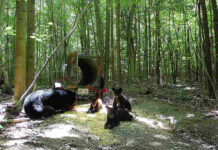The eighth grade volleyball team my daughter plays on suffered its first loss of the season Monday night. Both teams came in with 3-0 records, but one team had to go home as 3-1, while the other moved on at 4-0.
After the game, I attended a meeting where several people knew I had been at the game.
“Did they win,” one asked?
“No,” I answered, “they lost big time.”
“Well, it must have been the officiating,” another responded.
“No, the ref was actually pretty good,” I said.
“OK, it must have been the gym. Was it hot in there?”
“Well, it was hotter in our own home gym last week.”
Truth be told, we couldn’t point fingers for the loss at anyone other than ourselves. The opposing team was playing to win; we were just playing not to lose. There’s a difference.
It’s easy to blame others and outside factors for our setbacks – including farming setbacks. It’s the government. It’s the consumer. It’s the markets. It’s the co-op. It’s the ‘independents.’ And more and more, we’re hearing, “it’s the big guys.”
Balderdash! Regular readers know I abide no whining from those who refuse to take responsibilities for their own choices, their own actions, their own operations.
This has not been a good year for farming. The general economy hiccupped. The rain washed away spring. Then scorching heat zapped crops. Grain markets stayed grim. Feed prices jumped. Hog prices took a dive, just like milk prices earlier in the year. Not a lot happened that fed optimism, except for low interest rates.
Ken Bailey, Penn State ag economist, agrees there’s always room for personal improvement on individual farms, regardless of size, and in a paper he’s about to present in Wisconsin, he outlines some key points farm operators should focus on, rather than complaining about outside factors.
No business can survive without increasing sales each year, Bailey observes. It’s not rocket science, it’s just a simple fact that if you want to keep ahead of inflation, you have to increase your farm’s sales in order to have money to live on. On a dairy farm, that tells you to look at ways to improve productivity per cow, for example, or to add five cows next year.
Bailey also bravely acknowledges that poor business knowledge is a main reason farms go under. Farmers “need more than just a good work ethic to make it in the business world,” he writes. I say we need to exercise our brains as much as we strain our muscles to get ahead (do you know your individual enterprises’ cost of production?).
“Small dairy farms can be almost as profitable as larger ones, on a per hundredweight basis,” Bailey observes. “The benefits that accrue to larger dairy operations, called economies of scale, are a real advantage. However, they are not significant enough so that smaller operations cannot compete. There is a future for those dairy operations that want to remain small, but profitable.”
“Smaller farms must focus on those attributes that make larger ones successful. They must improve productivity, focus their investments on where they can get a positive return, manage debt, and control costs. They must also improve management skills in order to tie together all the various aspects of the operation that drive efficiencies.”
His words are not dairy-specific, but cut to the realities of all farms: “Success should reflect a careful balance between annual contribution to family living and equity growth over time.”
Remember the adage: Change is constant; the pace isn’t.









